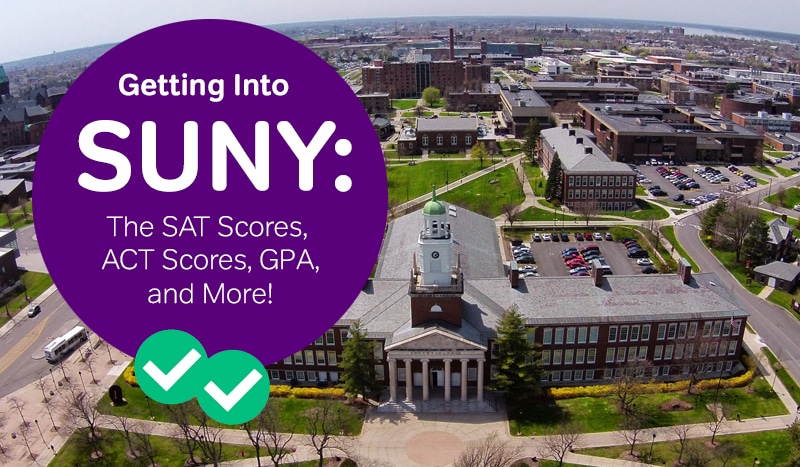
How do you get into SUNY? What are the SUNY SAT scores, SUNY ACT scores, SUNY admissions statistics, etc. for your target SUNY school?
SUNY Admissions, SUNY SAT Scores, and SUNY ACT Scores: One System, Many Campuses
SUNY isn’t just one of the best public university systems in the U.S. It’s also one of the biggest and most complex groups of schools. SUNY administers or sponsors more than 30 universities, and quite a few community colleges as well. (For a full list and description of the many schools in the SUNY system, see this Wikipedia page.)
In this article, we’re going to look at SUNY’s top 6 schools, the ones that are rated as national universities by US News and World Report. These schools are: Binghamton University, University of Albany, Stony Brook University, University of Buffalo, Purchase College, and the SUNY College of Environmental Science and Forestry.
In the table below, I’ve listed SUNY ACT scores and SUNY ACT scores for the SUNY top 6. I’ve also listed each campus’s US News and World Report national rank, its acceptance rate, and its GPA expectations. (Note: All data in the table comes either directly from SUNY, or from the National Association for College Admission Counseling, or from US News and World Report.)
| SUNY School Name | SAT Requirments | ACT Requirements | GPA Expectations | Acceptance Rate | National Ranking |
|---|---|---|---|---|---|
| Binghamton University | Reading & Writing: 660-730 Math: 660-740 (middle 50%) |
28-32 (middle 50%) |
3.7-3.9 (middle 50%) |
40% | 79 |
| SUNY College of Environmental Science and Forestry | Reading & Writing: 560-660 Math: 560-650 (middle 50%) |
23-27 (middle 50%) |
3.75 (average) |
61.4% | 121 |
| Stony Brook University | Whole test: 1230-1420 Reading & Writing: 600-680 Math: 630-740 (middle 50%) |
26-31 (middle 50%) |
3.6-4.0 (middle 50%) |
41% | 91 |
| University of Buffalo | Whole test:1160-1330 (middle 50%) |
24-29 (middle 50%) |
3.6 (average) |
56% | 79 |
| University of Albany | Whole test: 1100-1260 (middle 50%) |
22-27 (middle 50%) |
3.0-3.7 (middle 50%) |
52% | 147 |
| Purchase College | No requirements (submitting scores is optional) | No requirements (submitting scores in optional) | 3.34 (average) |
42.5% | 164 |
SUNY SAT Scores and their Role in SUNY Admissions
The first thing you’ll notice about the requirements for SUNY SAT scores is that they are kind of unpredictable. Depending on which school you’re applying to, the middle 50% of SUNY SAT scores can drop as low as the low 1100s, or go as high as the upper 1400s. Moreover, some schools’ published SUNY SAT scores are whole-test scores, while other SUNY SAT scores are based on the two subscores of the SAT, Math and Reading & Writing. One school, Purchase College, doesn’t even require students to give SUNY SAT scores.
To make things even more interesting, the level of SUNY SAT scores required is not strictly tied to school rank. Stony Brook University, for instance, is ranked below the SUNY College of Environmental Science and Forestry, but has far higher whole-test requirements. If you carefully look at the chart above, you’ll find other instances where a lower-ranking university actually has higher SUNY SAT scores than a higher-ranked campus.
OK, next, let’s look at how SUNY SAT scores compare to SUNY ACT scores.
SUNY Admissions: Expectations for SUNY ACT Scores
So how do SUNY ACT scores stack up to SUNY SAT scores? Most obviously, you won’t see any subscore requirements for the ACT. This is because the ACT does not have subscores. This makes comparing the different SUNY ACT scores relatively easy.
Here again, we also see an imperfect correlation between university rank and SUNY admissions requirements for ACT scores. Binghamton, the top-ranked university, has the highest expectations, with a 28-32 range for their SUNY ACT scores. And Purchase College, SUNY’s lowest-ranked national university, has the lowest expectations, which is to say no expectations. But in between those predictable top and bottom ranks, the requirements for SUNY ACT scores “jump around” a little.
SUNY Admissions: What’s up with the SUNY Acceptance Rate?
The acceptance rates for the top 6 SUNY campuses aren’t exactly directly tied to school rank either. Isn’t the table above full of surprises? Yes, Binghamton University has a 40% acceptance rate, technically the lowest acceptance rate on the list. But Binghamton actually ties for lowest with Stony Brook, the third-ranked school on the list. And yet at the same time, Stony Brook ties with the University of Buffalo for rank, but not for acceptance rate; University of Buffalo has a surprising 56% acceptance rate, more than 15% higher than Stony Brook’s.
Notice that these acceptance rates are also not directly correlated to SUNY SAT Scores or SUNY ACT scores. Just because a given SUNY school has higher standardized test scores does not mean it will have a lower acceptance rate, in other words.
Ultimately, if acceptance rate is an important criterion for you, you should carefully double-check the acceptance rate of any SUNY school you apply to.
SUNY GPA: The “Constant” in SUNY Admissions
So why all the inconsistency in SUNY SAT scores and SUNY ACT Scores? When we look at SUNY GPA requirements, the mystery is solved. This is where SUNY admissions criterion becomes predictable and consistent. The higher the school ranks, the higher the expectations are for GPA.
Ultimately, it is your high school grades–your GPA–that is the most important aspect of how to get into SUNY. With this criterion emphasized over all others, test scores can fluctuate a bit from school to school.
This doesn’t mean, however, that SUNY SAT scores or SUNY ACT scores are unimportant. Yes, SUNY admissions offices emphasize the importance of high school performance. How to get into SUNY includes many other factors. SUNY also looks at the bigger picture when considering applicants. SUNY will consider each students’ test scores, extracurricular activity, and general profile. And speaking of general profile, let’s take a look at the SUNY freshman profile next.
How to Get into SUNY as a First Year Student: The SUNY Freshman Profile
Every university has its own unique freshman profile. To explore the freshman profile for each of the six SUNY national campuses, we’d need to go very in-depth, explaining the subtle differences at length. Rather than give you that many details to sort through, it’s probably more helpful to look at the freshman profile for SUNY Binghamton. Why? Because Binghamton University is the most competitive SUNY school, period. So if you meet most or all of the standard’s of Binghamton’s freshman profile, you probably have a chance of admission at any SUNY school.
Let me tell you the most important thing you need to know about Binghamton’s freshman profile: If you are applying as a freshman (as opposed to a transfer student), the expectations you face are different.
Freshman applicants to Binghamton face testing expectations that are a little bit more lenient. The middle 50% of all Binghamton accepted applicants (including transfer students) have ACT scores between 29-32. But the middle half of accepted freshman score between 28-31 on the ACT. And it’s not just ACT expectations that are easier for freshmen. While test SAT scores range from 1310-1455 for all Binghamton applicants, but the mid-range for accepted freshman is 1290-1420.
But it’s not all a bed of roses for you first-year applicants. There are two areas where freshmen are held to slightly higher criteria than the overall group of Binghamton applicants. One of these areas is GPA. (Again, GPA is consistently the most important aspect of SUNY admissions!) The middle half of all SUNY Binghamton applicants have GPA scores ranging from 3.7 to 3.9. Binghamton freshmen, however, take their middle 50% GPA up a notch, with a range of 3.7 to 4.0. Secondly, first year, non-transfer applicants to SUNY Binghamton have an acceptance rate that is a tiny bit lower, 40% instead of the 41% for applicants overall.
Other SUNY Admissions Requirements and Info
We’ve already covered SUNY SAT scores, SUNY ACT scores, and SUNY GPA in great detail. Now, let’s talk about a few other important aspects of how to get into SUNY.
A key thing to remember is location, location, location! What do I mean by this? Well, all of the SUNY schools are in New York state. Among the fifty states in the USA, it could easily be argued that New York has the richest history of higher education, learning, and research. In addition, with the internationally legendary New York City as its cultural center, the state of New York prides itself in attracting adventurous, global citizens. Where SUNY admissions are concerned, SUNY looks for these kinds of people as well.
For a example of how adventure-loving global thinkers do well in SUNY admissions, see SUNY Binghamton’s undergraduate admissions web page. There, SUNY’s highest-ranked campus calls for students who are innovative, creative, and adventurous. They say they want applicants who come from diverse backgrounds and are critical thinkers that challenge the status quo. In short, SUNY admissions offices like to see that you are an interesting, ambitious, well-rounded person. Make sure the real and fascinating you shines through on your SUNY application. And of course, as part of this whole picture, competitive SUNY SAT scores, SUNY ACT scores, and SUNY GPA are important too.
SUNY Admissions, SUNY SAT Scores, and SUNY ACT Scores: An FAQ
I’ve covered all the basics of SUNY admissions above. Beyond those basics, there are a number of extra questions students often have about SUNY admissions, SUNY SAT scores, and SUNY ACT scores. Here are answers to some of our readers’ frequently asked questions. If you still have more questions by the end of this FAQ, ask them in the comments, and one of our experts will give you a reply.
For SUNY SAT scores, is a 1200 SAT score good? What about a 1400 SAT Score?
Where SUNY admissions are concerned, a 1200 SAT score is good for most SUNY schools. However, a 1200 on the SAT is not-so-good for SUNY Binghamton or SUNY Stony Brook. At these two highly competitive SUNY campuses, a 1200 would put you in the bottom 25%. But a 1400 on the SAT is good by the standards of any SUNY school. With that impressive score, you’ll be in the middle 50% or top 25% of any SUNY pool of applicants.
Is 24 good by the standards of SUNY ACT Scores?
Students often ask about that 24 ACT score benchmark. As you saw in the table near the beginning of this article, a 24 for the ACT is less-than-stellar for SUNY. That ACT 24 will either put you in the bottom 25% of applicants or in the lower part of the middle 50%, depending on which SUNY school you apply to.
SUNY GPAs are listed in 0 to 4.0 range. How do my letter grades translate into that GPA?
The system for converting letter grades to GPA is a little complicated, but have no fear! Magoosh has created an easy, user-friendly set of tables for calculating your GPA. See our article “How to Convert your GPA” for all the GPA conversion tools you need.
How can I get good letters of recommendation to attach to my SUNY application?
The best letters of recommendation tend to come from your high school teachers. In fact, many SUNY campuses specifically ask for recommendations from teachers, rather than ones from work supervisors, clergy, family, etc. For tips on how to approach your teachers and round up some good letters of recommendation, Magoosh again has you covered. Check out our article “How to Ask for a Letter of Recommendation.”
What does SUNY Admissions look for in an application essay?
SUNY ACT Scores and SUNY SAT scores for the essay portions of those tests are not-so-emphasized and are sometimes optional. But SUNY admissions will always want to see a good application essay. And–you guessed it–Magoosh has a guide that covers this frequently-asked question as well. See our guide to writing a typical type of college admissions essay (Common App), and you’ll be on your way to SUNY admissions success.
How to Get Into SUNY: The Takeaway
SUNY emphasizes personality and long-term hard work over test scores. By all means, study to get good SAT or ACT results. But remember that your test scores are part of a larger picture. Good test scores plus good efforts at high school courses will appeal to SUNY. Then, let your unique personality shine through, on your application and in life. With your spirit as an eager learner added to the equation, your application will be SUNY-ready.






Leave a Reply